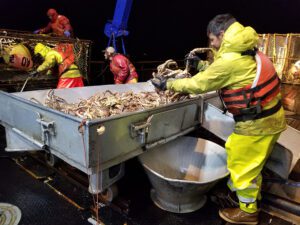
Harvesters in the Bristol Bay red king crab fishery are partnering with federal and state agencies to collect critical winter data in a month-long project that was slated to start in March.
The research goal is to collect data sought by the North Pacific Fishery Management Council to help shape decisions on how to improve those stocks and allow the multi-million-dollar fishery to resume.
The study’s lead, Mike Litzow of NOAA Fisheries’ Alaska Fisheries Science Center, said the collaboration offered an exciting chance to study these crab stocks in winter.
“That’s when people really interact with the stock – the Bristol Bay red king crab fishery and many other fisheries that potentially interact with crab take place in fall and winter,” Litzow said. “But because of the difficulty of working in the Bering Sea in winter, we don’t have great data then. This is a great opportunity to fill that data gap.”
Bristol Bay red king crab is one of the most valuable commercial fisheries, but it was cancelled in 2021 under state of Alaska harvest control rules, and again in 2022.
With crabbers out of work, the crab industry proposed a research opportunity that has the crabbers working at sea with scientists on winter research that would otherwise not be possible.
“The Bering Sea crab industry is very encouraged to be working with NOAA Fisheries and Alaska Department of Fish and Game. The agencies hustled to get research going in short order to help address the dire situation the crab industry is currently in,” Bering Sea Fisheries Research Foundation Executive Director Scott Goodman said.
“Both agencies are funding the project to prioritize urgent research that will help by getting some crab vessels and crew out on the water immediately to collect timely, important information,” Goodman added. “The project is also tackling some important pot gear work to refine options that would keep unwanted small crab out of pots, as lowering fishing impacts is a high priority for crabbers.”
The cooperative study is expected to provide a rapid research response to answer questions about winter distribution and movement. Late winter/spring is likely a vulnerable molting and mating period during the life of Bristol Bay red king crab.
Two crab boats and crew were to launch from Dutch Harbor to begin the research. The plan was three-fold, starting with the team conducting a crab pot survey to map winter/spring Bristol Bay red king crab distributions in and outside of protected areas.
The team was also to attach satellite tags to about 100 mature male red king crabs to track their movements and test gear modifications and pot-fishing methods to reduce discards by allowing non-legal crabs to exit pots. The plan called for all crab to be returned to sea alive after sampling.
